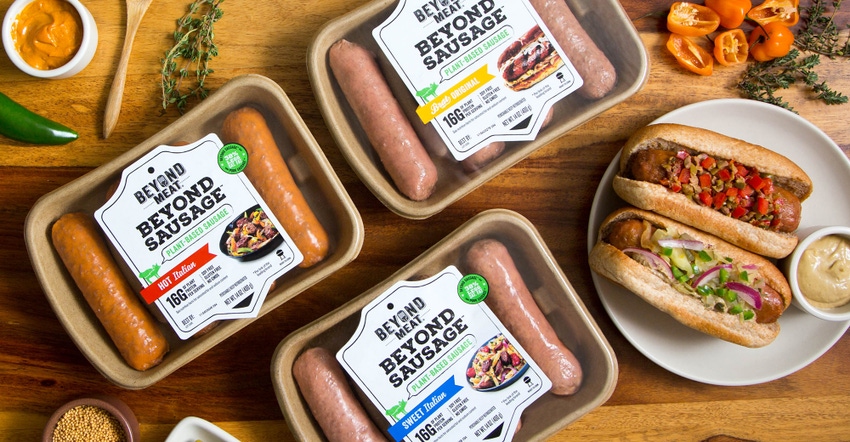States follow Missouri’s lead on defining meat
Nebraska, Tennessee, Virginia and Wyoming also look to pass state measures to limit false marketing of alternative meats.

Missouri was the first state to regulate the term “meat” on product labels, and now a handful of other states are looking to follow suit.
The goal of the Nebraska bill is to promote truth in advertising, said bill sponsor Sen. Carol Blood. "Meat comes from livestock, and that industry is paramount to the fiscal success of Nebraska. Nebraska's single largest industry is cattle. The multiplied impact each year is 12.1 million. Nebraska is also home to 3.1 million hogs and pigs and commercial operations can be found in nearly every county. The poultry industry also plays an important role in our economy," she said.
Blood stated in a statement that as plant-based food continues to be sold to Nebraska, some of those offerings claim to be plant-based meat. "Meat is livestock and that means cattle, calves, sheep, swine, ratite birds, including, but not limited to, ostrich and emu, llamas, alpaca, bison, elk, goats, horses, and rabbits raised in confinement for human consumption. It is any edible portion of any livestock or poultry carcass or part thereof and does not include lab-grown or insect or plant-based food products."
Blood further stated that "this will be consumer-driven and will not result in increased inspections or special offices being created. It is my goal to have the process be as simple as when you pick up the phone to express a consumer complaint to the Better Business Bureau. The goal is not to tell anyone what they should or should not consume; it is about integrity in marketing."
Similar measures are also in the works in Tennessee, Virginia and Wyoming.
In Iowa, the Iowa Cattlemen’s Assn. (ICA) has approved interim policy that supports use of the term “meat” to describe only those proteins derived from actual livestock raised by farmers and ranchers that are harvested for human consumption. The policy also supports oversight of alternative protein products by the USDA.
Whether it is called fake meat or clean meat, products containing alternative sources of protein have been appearing in supermarkets and restaurants around the country and are competing with traditionally raised animal agriculture products.
Nebraska Sen. Carol Blood (R) currently lives in Omaha, Neb., suburbs but grew up on a farm. She decided that the bill in Nebraska was needed after an interaction in a grocery store where two consumers were unable to determine if a product contained meat or a substitute.
Plant-based meat alternatives (such as from Impossible Foods Inc. and Beyond Meat) and cellular meats (from Memphis Meats and Mosa Meat) are two types of products that have been receiving national attention over the past few years, according to Eric Mittenthal, vice president of public affairs for the North American Meat Institute. Though these products are very different in how they are produced, both categories are targeting the marketing demographic dominated by animal agriculture.
“Their audience is not the traditional vegan or vegetarian looking for new products,” Mittenthal explained to a workshop audience on the sidelines of the American Farm Bureau Federation convention in New Orleans, La., in mid-January. “They want to compete in the meat case for meat eaters.”
Plant-based meat alternatives use a recipe of plant ingredients to imitate the properties of animal meat, while cell-based meats use cells taken from animals that are then grown in a lab. Even though plant-based “meats” are now on store shelves, cell-based meats are still unavailable. Mittenthal said the first commercially available cell-based meat could be ready as soon as this year, but it is still too expensive to be viable as a replacement for animal agriculture products.
The companies that are producing these products are not the only ones promoting them. Hannah Thompson-Weeman, vice president of communications for the Animal Agriculture Alliance, noted that many of the groups pushing for the widespread adoption of these products, such as the Good Food Institute and The Humane Society of The United States, have hostile views toward animal agriculture.
“These are well-funded groups opposed to animal agriculture,” Thompson-Weeman said. “From their perspective, there is no way we can raise animals for consumption that is ethical and responsible. Their end goal is ending meat consumption.”
The panelists agreed that the best way to combat the negative attacks by these groups is to:
Avoid disparaging consumer choices;
Correct misinformation, but do not engage in back-and-forth debates;
Focus on interested consumers versus extremists, and
Devote energy to sharing positive information about animal agriculture and meat.
“Customers want choice, and they need you to respect that they are entitled to choose,” said Leah McGrath, dietitian for BuildUp Dietitians. “Getting caught in the middle of these ideological battles is not helpful; it just creates negativity and suspicion. Take the high road, and tell your story about what makes your products great.”
About the Author(s)
You May Also Like




